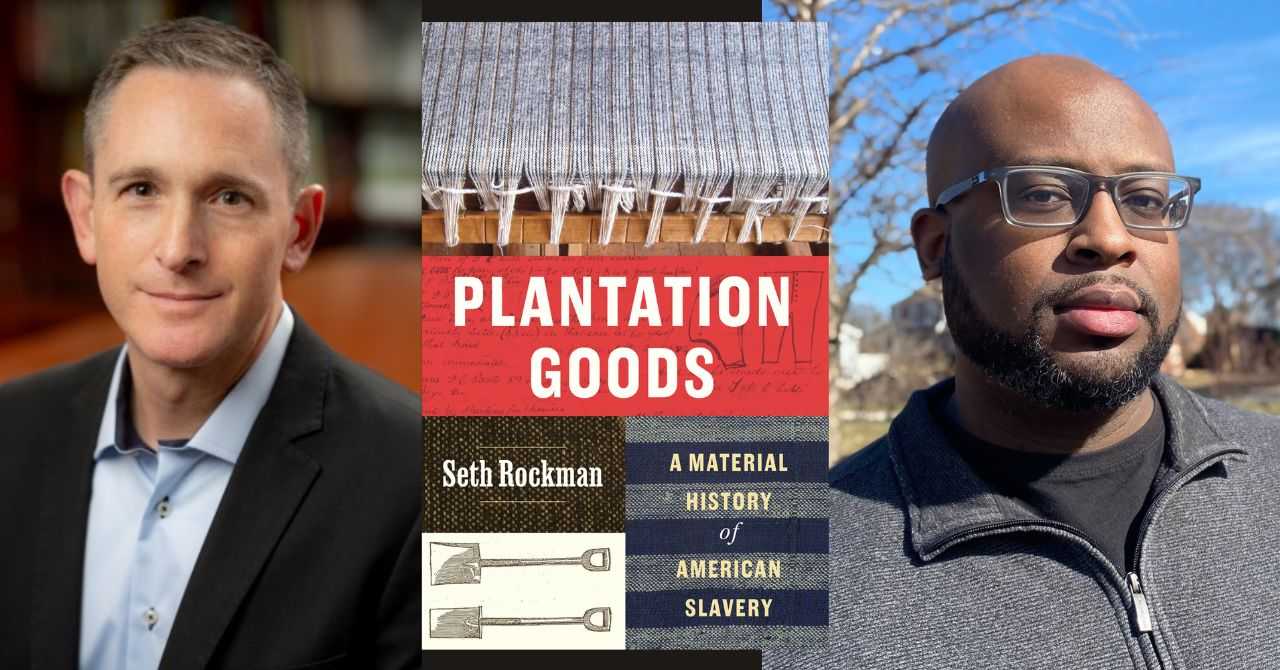- Cafe
- Bookstore
- Upcoming events
- Book an event
- Catering
- Institutional and bulk sales
- About Red Emma's
- Press
- Buy gift cards
- Red Emma's merch
- Jobs
- Red Emma's Education Fund
- Oleander
- Baltimore Book Festival 2025

Seth Rockman presents "Plantation Goods: A Material History of American Slavery" in conversation with Tony C. Perry
This event has already happened.
The industrializing North and the agricultural South—that’s how we have been taught to think about the United States in the early nineteenth century. But in doing so, we overlook the economic ties that held the nation together before the Civil War. We miss slavery’s long reach into small New England communities, just as we fail to see the role of Northern manufacturing in shaping the terrain of human bondage in the South. Using plantation goods—the shirts, hats, hoes, shovels, shoes, axes, and whips made in the North for use in the South—historian Seth Rockman locates the biggest stories in American history in the everyday objects that stitched together the lives and livelihoods of Americans—white and Black, male and female, enslaved and free—across an expanding nation.
By following the stories of material objects, such as shoes made by Massachusetts farm women that found their way to the feet of a Mississippi slave, Rockman reveals a national economy organized by slavery—a slavery that outsourced the production of its supplies to the North, and a North that outsourced its slavery to the South. Melding business and labor history through powerful storytelling, PLANTATION GOODS brings northern industrialists, southern slaveholders, enslaved field hands, and paid factory laborers into the same picture. In one part of the country, entrepreneurs envisioned fortunes to be made from “planter’s hoes” and rural women spent their days weaving “negro cloth” and assembling “slave brogans.” In another, enslaved people actively consumed textiles and tools imported from the North to contest their bondage. In between, merchants, marketers, storekeepers, and debt collectors laid claim to the profits of a thriving interregional trade.
Examining producers and consumers linked in economic and moral relationships across great geographic and political distances, PLANTATION GOODS explores how people in the nineteenth century thought about complicity with slavery while showing how slavery structured life nationwide and established a modern world of entrepreneurship and exploitation. Rockman brings together lines of American history that have for too long been told separately, as slavery and capitalism converge in something as deceptively ordinary as a humble pair of shoes.
Seth Rockman is associate professor of history at Brown University. He is the author of SCRAPING BY: WAGE LABOR, SLAVERY, AND SURVIVAL IN EARLY BALTIMORE and coeditor of SLAVERY’S CAPITALISM: A NEW HISTORY OF AMERICAN ECONOMIC DEVELOPMENT. Rockman serves on the faculty advisory board of Brown University’s Ruth J. Simmons Center for the Study of Slavery and Justice. He lives in Providence.
Tony C. Perry is Curator of Environmental History at the Smithsonian National Museum of American History. At the museum he stewards the Extractive Industries collections and is currently co-curating an exhibition on Gullah Geechee cultural and environmental heritage. His forthcoming book project examines the relationship between enslaved people and the environment in the Chesapeake Bay Watershed. He is also completing another book on water in the black experience, specifically water-related instances of environmental racism and how black communities have responded to such animus over time. He holds a Ph.D. in American Studies from the University of Maryland, College Park.

